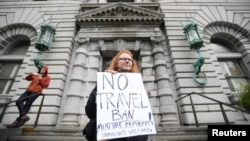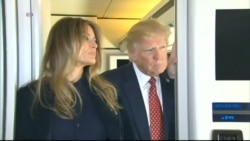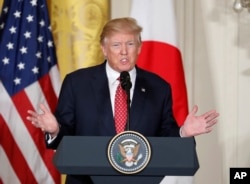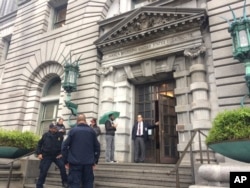U.S. President Donald Trump says he is considering a "brand new order" on immigration after an appellate court unanimously ruled against his order barring refugees and citizens from seven Muslim-majority countries from entering the United States.
Trump told reporters on board Air Force One Friday that a new executive order could be issued as soon as Monday or Tuesday, if the administration decides to pursue that course of action.
He said such a move might be faster than defending the current rule in court. "We need speed for reasons of security," he explained.
WATCH: Trump addresses travel ban options on Air Force One
Chief of Staff Reince Priebus sought to clarify to reporters, however, that "every single court option is on the table, including an appeal of the 9th Circuit decision on the TRO (temporary restraining order) to the Supreme Court, including fighting out this case on the merits."
Meanwhile, an unidentified judge on the 9th Circuit Court of Appeals requested the court's 25 full-time judges vote on whether the temporary block of the president's travel ban should be reheard before an 11-judge panel, known as en banc review, according to a court order. Both sides in the lawsuit have been asked to file briefs by next week.
Earlier Friday, Trump said he had “no doubt” that government attorneys would be able to overcome the appellate court's decision.
In the meantime, foreign travelers with valid visas can expect to enter the U.S. unhindered.
WATCH: Appeals Court refuses to reinstate Trump travel ban
Earlier, Trump said the legal dispute, which arose when states objected to the executive order, was not about politics but the security of the United States. Speaking at a White House news conference together with visiting Japanese Prime Minister Shinzo Abe, Trump said he would be announcing new measures to bolster U.S. security next week.
Trump did not disclose any details about the new security measures, but said he intends to bar from the United States people who are looking to do harm. Critics have charged that his original order discriminated against members of the Muslim faith.
Referring to Thursday's decision by a three-judge panel from the 9th U.S. Circuit Court of Appeals in San Francisco, the president indicated his administration will continue to pursue its case through the judicial system.
The appellate court let stand a lower court ruling that suspended Trump's immigration order, which has been widely referred to as a "ban," although it has more limited effects. The action allows travelers who were unable to enter the United States in late January to return and complete border formalities.
The ruling did not say definitively whether or not the president's action was constitutional. A professor law at Florida's University of Miami, David Abraham, told VOA the appeals court only reviewed the lower court order that halted enforcement of the president's order until its legality can be determined.
“The temporary bar, the 'putting on ice' of the president's executive order," will continue until the underlying question is resolved, Abraham said, "...whether the president has the power without either congressional or judicial support to bar people as he did.”
Appeal now seen uncertain
John Banzhaf, a law professor at George Washington University in the nation's capital, told VOA he believes any move by the Trump administration to immediately appeal the case to the Supreme Court is unlikely to succeed, because legal experts see the high court as ideologically divided, with four justices likely favoring Trump's view and the four others likely opposing it.
However, Banzhaf added, the administration’s chances of prevailing in court would rise if the case is delayed until Trump's nominee to fill the vacant ninth seat on the Supreme Court, Judge Neil Gorsuch, is installed. A win for the government would be more likely, he said, if the case is put off until Gorsuch is confirmed by the Senate and sworn in; Gorsuch was only nominated on January 31, and the confirmation process is widely expected to take months.
“If they wait until the lower courts decide the underlying, important issues - does the president have this authority? Is it constitutional? - by the time that important issue gets up to the Supreme Court, there will almost certainly be nine justices,” Banzhaf said.
Trump took to Twitter following the appellate court's ruling on Thursday: “See you in court, the security of our nation is at stake.” A short time later, he told reporters at the White house that the court made a "political decision," and said his administration eventually would win the case "very easily."
Opponents warn of 'chaos'
In court arguments earlier this week, government attorney August Flentje argued that Trump's executive order was within the powers granted to him by Congress and the Constitution. In opposition, the solicitor general of Washington state, Noah Purcell, said reinstating the travel ban without a full judicial review would throw the country "back into chaos," with families separated and travelers confused and wondering whether they would be able to enter the country.
The University of Miami's Professor Abraham said it would be easier for Trump to replace the executive orders rather than try to fix them. “These orders are tainted beyond recognition and the administration has already backed off substantial parts of them,” he said.
Trump’s original order was set to expire in 90 days, meaning it could expire before the issues goes before the Supreme Court. Before then, however, the administration could revise the scope of the order or its duration.









